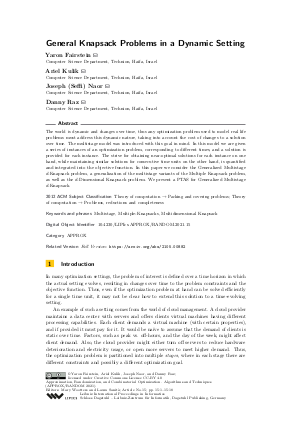General Knapsack Problems in a Dynamic Setting
Authors Yaron Fairstein, Ariel Kulik, Joseph (Seffi) Naor, Danny Raz
-
Part of:
Volume:
Approximation, Randomization, and Combinatorial Optimization. Algorithms and Techniques (APPROX/RANDOM 2021)
Part of: Series: Leibniz International Proceedings in Informatics (LIPIcs)
Part of: Conference: International Conference on Randomization and Computation (RANDOM)
Part of: Conference: International Conference on Approximation Algorithms for Combinatorial Optimization Problems (APPROX) - License:
 Creative Commons Attribution 4.0 International license
Creative Commons Attribution 4.0 International license
- Publication Date: 2021-09-15
File

PDF
LIPIcs.APPROX-RANDOM.2021.15.pdf
- Filesize: 0.69 MB
- 18 pages
Document Identifiers
Related Versions
- Full Version https://arxiv.org/abs/2105.00882
Subject Classification
ACM Subject Classification
- Theory of computation → Packing and covering problems
- Theory of computation → Problems, reductions and completeness
Keywords
- Multistage
- Multiple-Knapsacks
- Multidimensional Knapsack
Metrics
- Access Statistics
-
Total Accesses (updated on a weekly basis)
0Document
0Metadata
Abstract
The world is dynamic and changes over time, thus any optimization problem used to model real life problems must address this dynamic nature, taking into account the cost of changes to a solution over time. The multistage model was introduced with this goal in mind. In this model we are given a series of instances of an optimization problem, corresponding to different times, and a solution is provided for each instance. The strive for obtaining near-optimal solutions for each instance on one hand, while maintaining similar solutions for consecutive time units on the other hand, is quantified and integrated into the objective function. In this paper we consider the Generalized Multistage d-Knapsack problem, a generalization of the multistage variants of the Multiple Knapsack problem, as well as the d-Dimensional Knapsack problem. We present a PTAS for Generalized Multistage d-Knapsack.
Cite As Get BibTex
Yaron Fairstein, Ariel Kulik, Joseph (Seffi) Naor, and Danny Raz. General Knapsack Problems in a Dynamic Setting. In Approximation, Randomization, and Combinatorial Optimization. Algorithms and Techniques (APPROX/RANDOM 2021). Leibniz International Proceedings in Informatics (LIPIcs), Volume 207, pp. 15:1-15:18, Schloss Dagstuhl – Leibniz-Zentrum für Informatik (2021)
https://doi.org/10.4230/LIPIcs.APPROX/RANDOM.2021.15
BibTex
@InProceedings{fairstein_et_al:LIPIcs.APPROX/RANDOM.2021.15,
author = {Fairstein, Yaron and Kulik, Ariel and Naor, Joseph (Seffi) and Raz, Danny},
title = {{General Knapsack Problems in a Dynamic Setting}},
booktitle = {Approximation, Randomization, and Combinatorial Optimization. Algorithms and Techniques (APPROX/RANDOM 2021)},
pages = {15:1--15:18},
series = {Leibniz International Proceedings in Informatics (LIPIcs)},
ISBN = {978-3-95977-207-5},
ISSN = {1868-8969},
year = {2021},
volume = {207},
editor = {Wootters, Mary and Sanit\`{a}, Laura},
publisher = {Schloss Dagstuhl -- Leibniz-Zentrum f{\"u}r Informatik},
address = {Dagstuhl, Germany},
URL = {https://drops.dagstuhl.de/entities/document/10.4230/LIPIcs.APPROX/RANDOM.2021.15},
URN = {urn:nbn:de:0030-drops-147081},
doi = {10.4230/LIPIcs.APPROX/RANDOM.2021.15},
annote = {Keywords: Multistage, Multiple-Knapsacks, Multidimensional Knapsack}
}
Author Details
References
-
Hyung-Chan An, Ashkan Norouzi-Fard, and Ola Svensson. Dynamic facility location via exponential clocks. ACM Transactions on Algorithms (TALG), 13(2):1-20, 2017.

-
Evripidis Bampis, Bruno Escoffier, Michael Lampis, and Vangelis Th Paschos. Multistage matchings. In 16th Scandinavian Symposium and Workshops on Algorithm Theory (SWAT 2018), volume 101, pages 7-1, 2018.

-
Evripidis Bampis, Bruno Escoffier, Kevin Schewior, and Alexandre Teiller. Online multistage subset maximization problems. In European Symposium on Algorithms (ESA), volume 144. Schloss Dagstuhl-Leibniz-Zentrum fuer Informatik, 2019.

-
Evripidis Bampis, Bruno Escoffier, and Alexandre Teiller. Multistage knapsack. In Mathematical Foundations of Computer Science (MFCS), volume 138, pages 22-1. Schloss Dagstuhl-Leibniz-Zentrum fuer Informatik, 2019.

-
Gruia Calinescu, Chandra Chekuri, Martin Pál, and Jan Vondrák. Maximizing a submodular set function subject to a matroid constraint. In International Conference on Integer Programming and Combinatorial Optimization, pages 182-196. Springer, 2007.

-
Chandra Chekuri and Sanjeev Khanna. On multidimensional packing problems. SIAM journal on computing, 33(4):837-851, 2004.

-
Markus Chimani, Niklas Troost, and Tilo Wiedera. Approximating multistage matching problems. arXiv preprint arXiv:2002.06887, 2020.

-
Shichuan Deng, Jian Li, and Yuval Rabani. Approximation algorithms for clustering with dynamic points. In 28th Annual European Symposium on Algorithms (ESA 2020). Schloss Dagstuhl-Leibniz-Zentrum für Informatik, 2020.

-
David Eisenstat, Claire Mathieu, and Nicolas Schabanel. Facility location in evolving metrics. In International Colloquium on Automata, Languages, and Programming, pages 459-470. Springer, 2014.

-
Yaron Fairstein, Ariel Kulik, Danny Raz, et al. General knapsack problems in a dynamic setting. arXiv preprint arXiv:2105.00882, 2021.

-
Yaron Fairstein, Ariel Kulik, and Hadas Shachnai. Modular and submodular optimization with multiple knapsack constraints via fractional grouping. In 29th Annual European Symposium on Algorithms (ESA 2021), 2021. (To appear).

-
Yaron Fairstein, Seffi Joseph Naor, and Danny Raz. Algorithms for dynamic nfv workload. In International Workshop on Approximation and Online Algorithms, pages 238-258. Springer, 2018.

-
Uriel Feige. A threshold of ln n for approximating set cover. Journal of the ACM (JACM), 45(4):634-652, 1998.

-
Uriel Feige and Michel Goemans. Approximating the value of two power proof systems, with applications to max 2sat and max dicut. In Proceedings Third Israel Symposium on the Theory of Computing and Systems, pages 182-189. IEEE, 1995.

-
Till Fluschnik, Rolf Niedermeier, Valentin Rohm, and Philipp Zschoche. Multistage vertex cover. In 14th International Symposium on Parameterized and Exact Computation (IPEC 2019). Schloss Dagstuhl-Leibniz-Zentrum fuer Informatik, 2019.

-
Till Fluschnik, Rolf Niedermeier, Carsten Schubert, and Philipp Zschoche. Multistage st path: Confronting similarity with dissimilarity in temporal graphs. In 31st International Symposium on Algorithms and Computation (ISAAC 2020). Schloss Dagstuhl-Leibniz-Zentrum für Informatik, 2020.

-
Fabrizio Grandoni and Rico Zenklusen. Approximation schemes for multi-budgeted independence systems. In European Symposium on Algorithms, pages 536-548. Springer, 2010.

-
Anupam Gupta, Kunal Talwar, and Udi Wieder. Changing bases: Multistage optimization for matroids and matchings. In International Colloquium on Automata, Languages, and Programming, pages 563-575. Springer, 2014.

-
Ariel Kulik and Hadas Shachnai. There is no eptas for two-dimensional knapsack. Information Processing Letters, 110(16):707-710, 2010.

-
George L Nemhauser and Laurence A Wolsey. Best algorithms for approximating the maximum of a submodular set function. Mathematics of operations research, 3(3):177-188, 1978.

-
Alexander Schrijver. Combinatorial optimization: polyhedra and efficiency, volume 24. Springer Science & Business Media, 2003.

-
Vijay V Vazirani. Approximation algorithms. Springer Science & Business Media, 2013.

